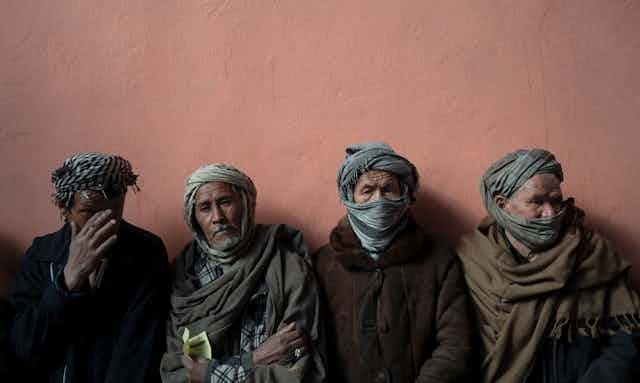The Americans are gone, the war is over, but the worst is arguably yet to come in Afghanistan.
The country is facing an unprecedented crisis. Afghan civilians have always disproportionately experienced the effects of war and they will now also disproportionately experience what may be an even worse peace — if one can even call it that.
Islamic State Khorasan Province (ISKP) is on the rise in the east, and the executions of former Afghan National Security Forces, peace activists and cultural icons are being carried out by the Taliban. Women and girls are in a particularly dangerous place as many of their hard-earned freedoms have been overturned.
Read more: The world must not look away as the Taliban sexually enslaves women and girls
The economy of Afghanistan is faring no better in that, essentially, there isn’t one. Basic services are barely running and salaries are not being paid. While the West rightfully pressures the Taliban to allow girls to attend school, there is no funding for these schools and teachers aren’t receiving wages.
Both public and private assets have been also been frozen. Although estimates vary, the Afghan economy is expected to shrink by 30 per cent and the lingering costs of the American withdrawal will be enormous.
Starvation a looming risk
Partially contributing to the collapse of the Afghan economy is diminished humanitarian aid. For a country to be considered aid-dependent, 10 per cent of its GDP must come from foreign aid.
In the case of Afghanistan, that number hovers around 40 per cent. Coupled with this, billions of dollars in state and private assets, estimated to be in the range of US$8-10 billion, have been frozen.
While Afghanistan is no stranger to economic shocks — troop withdrawals in 2014 weakened the Afghan economy significantly — it nevertheless rebounded. But nothing compares to the situation that currently threatens Afghanistan, and with millions facing a food crisis, the stakes this time around are much higher.
It’s estimated that without significant and urgent assistance, hundreds of thousands of people in Afghanistan risk starvation. The United Nations has, most recently, estimated that without urgent aid, 22.8 million people are likely to experience severe food stresses.
Food alone is the most immediate concern, but with the complete breakdown of the health-care system, the food crisis will be compounded as treatable diseases proliferate through the country. Health-care services have essentially ground to a halt and medicine is in extremely short supply.

Most of the aid workers who were issuing high-impact assistance left following the United States withdrawal and subsequent evacuation over the summer. With winter approaching, further disaster is looming, and there are concerns that most of the country will not be able to afford electricity. The cash shortages are especially dire as Afghanistan imports approximately 78 per cent of its energy needs.
The dilemma
Although the worst impacts of the U.S. withdrawal and Taliban takeover can be mitigated by foreign aid, it’s a Band-aid solution that only goes so far. Western states are grappling with what looks like an intractable dilemma — how to support the Afghan people without supporting and by extension lending legitimacy to the Taliban government?
Western states are trying to strike this balance, but have not yet found a way. And it’s debatable whether such a strategy even exists. Aid can be administered, but sustainable capacity and development cannot be built without engagement with the government — one that the West isn’t willing to recognize.

So, just as during the 20-year war itself, Afghanistan is in a stalemate.
International organizations, particularly the UN and to an extent the European Union, can play a key role in helping prevent further catastrophe, but there are limits to what they can provide.
The UN is better positioned to do this. Throughout the course of the war in Afghanistan, the UN tried to remain a third-party mediator that promoted the interests and well-being of the Afghan people. The UN can also play a key co-ordinating role free of some of the political pressures national governments face by working with non-governmental organizations whose primary goals are focused on alleviating the unfolding humanitarian crisis.
But international alliances also face dilemmas.
Vague benchmarks
The European Union, for example, has identified vague benchmarks that will inform its future engagement with Afghanistan: respect for freedom of movement for foreign nationals and Afghan nationals; human rights, with a particular emphasis on the rights of women and girls; allowing humanitarian operations to proceed; and establishing a representative government.
The difficulty is, ultimately, that thresholds have not been specified. How much progress, and which metrics, need to be achieved remain unclear and unspecified. Does engagement necessitate a return to comparable levels of rights that were seen before the Taliban took over?
This is not something that is unique to the EU. Every western state is grappling with what the Taliban must do before sanctions are lifted and diplomatic ties are established — if they ever are.
Unfortunately, as the West contemplates these questions, the people of Afghanistan will suffer profoundly.

